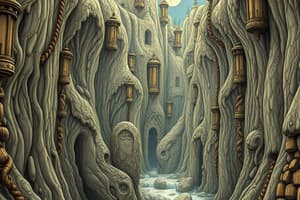Podcast
Questions and Answers
What is the difference between weathering and erosion?
What is the difference between weathering and erosion?
Weathering is the physical or chemical breakdown of rock. Erosion is the removal of weathered pieces of rock to another place.
What is the difference between mechanical and chemical weathering?
What is the difference between mechanical and chemical weathering?
Mechanical weathering is the physical breakdown of rock into smaller pieces. Chemical weathering is the breakdown of rock by chemical processes.
How do water and ice cause mechanical weathering?
How do water and ice cause mechanical weathering?
Water causes mechanical weathering through collisions caused by rivers or ocean waves and ice causes it through scraping by glaciers and freezing water in cracks.
How does the movement of air cause mechanical weathering?
How does the movement of air cause mechanical weathering?
How are rocks and landforms changed by mechanical weathering?
How are rocks and landforms changed by mechanical weathering?
What is weathering?
What is weathering?
What is mechanical weathering?
What is mechanical weathering?
What is chemical weathering?
What is chemical weathering?
What is erosion?
What is erosion?
What is sediment?
What is sediment?
What type of change does chopping a piece of wood in half represent?
What type of change does chopping a piece of wood in half represent?
How are ice and water involved in mechanical weathering?
How are ice and water involved in mechanical weathering?
How is temperature related to mechanical weathering?
How is temperature related to mechanical weathering?
What is hydrolysis?
What is hydrolysis?
Explain how oxygen is connected to chemical weathering.
Explain how oxygen is connected to chemical weathering.
What are some factors that can control the rate at which a rock weathers?
What are some factors that can control the rate at which a rock weathers?
Flashcards are hidden until you start studying
Study Notes
Weathering and Erosion
- Weathering: Physical or chemical breakdown of rocks.
- Erosion: Removal and transportation of weathered rock particles.
Mechanical vs Chemical Weathering
- Mechanical weathering: Physical process reducing rocks into smaller fragments.
- Chemical weathering: Breakdown of rocks via chemical reactions.
Role of Water and Ice in Mechanical Weathering
- Water causes mechanical weathering through abrasion in rivers and ocean waves.
- Ice contributes by freezing water in rock cracks, expanding and widening them (ice wedging).
Wind's Influence on Mechanical Weathering
- Wind can cause abrasion by blowing sand against rocks, leading to wear.
Effects of Mechanical Weathering on Rocks and Landforms
- Rocks: Broken into smaller fragments through abrasion and pressure.
- Landforms: Worn down by various mechanical weathering agents.
Weathering Definition
- Weathering involves the reduction of rock to smaller pieces through wind, rain, and temperature fluctuations.
Mechanical Weathering Characteristics
- Involves physical changes initiated by natural elements like water and wind.
Chemical Weathering Characteristics
- Occurs when air and water constituents chemically interact with rocks and minerals, resulting in alteration.
Erosion Definition
- Erosion is the movement of rock and soil materials across Earth’s surface by natural forces like wind and water.
Definition of Sediment
- Solid materials transported by wind and water that deposit on land surfaces or the bottoms of water bodies.
Physical Change Example
- Chopping a piece of wood in half represents a physical change, involving alteration in form but not in composition.
Ice and Water's Role in Mechanical Weathering
- Ice wedging involves the freezing water that expands cracks in rocks, facilitating weathering.
Temperature's Impact on Mechanical Weathering
- Decreasing temperatures cause water to freeze, further expanding rock fractures.
Hydrolysis Definition
- Hydrolysis: A form of chemical weathering where water contributes to the breakdown of minerals and rocks.
Oxygen's Role in Chemical Weathering
- Oxygen can physically alter rock structures through its reactive nature.
Factors Affecting Weathering Rate
- Key influences on weathering rates include temperature, climate, availability of water, and the duration of exposure to weathering agents.
Studying That Suits You
Use AI to generate personalized quizzes and flashcards to suit your learning preferences.




